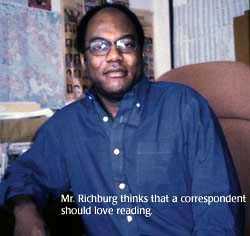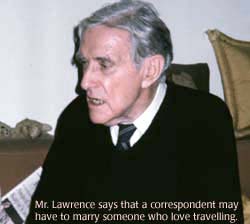 Foreign correspondents (journalists working overseas for a specific
organization), are responsible for covering news of a particular region of the world.
Foreign correspondents (journalists working overseas for a specific
organization), are responsible for covering news of a particular region of the world.
Mr. Anthony Lawrence and Mr. Keith B. Richburg are the Far East's correspondents with bases in Hong Kong.
Mr. Richburg, the Southeast Asia Bureau Chief of The Washington Post, came from the United States.
Mr. Lawrence, who came from Britain, used to be the correspondent in the Far East for the British Broadcasting Corporation. He retired from BBC at the age of 62.
Advantage experiences for foreign correspondentsBoth Mr. Lawrence and Mr. Richburg think that a reporter should have experience in reporting local news for two to three years before being a correspondent.
Explained Mr. Richburg: "It is easier to learn reporting skills and interviewing techniques in the home country.
"If they learn these skills before going abroad, they only need to cope with the new culture."
In Mr. Lawrence's opinion, a university degree in journalism is not necessarily an advantage for being a correspondent.
"A correspondent must be interested in people and this may not be trained in university education," said Mr. Lawrence.
In fact, Mr. Lawrence did not get any university degree when he started working with a weekly paper in 1930 in Britain.
However, Mr. Richburg holds a different viewpoint.
He got a degree at the University of Michigan in 1980.
Said he: "I think one can get experience in interviewing, doing research and getting information at the university.
"Besides, professors may be able to give the graduate students good connections which may help their careers."
Mr. Richburg also gives some criteria for people who want to be successful correspondents.
Said he: "First, they should love reading everything and be curious about the world.
"Also, they should enjoy travelling and experiencing different cultures."
Difficulties encountered by foreign correspondentsBoth Mr. Lawrence and Mr. Richburg think foreign correspondents may get tired of travelling by air as they have to fly to different countries in the region frequently to collect news for their organizations.
"One of the difficulties I faced for being a correspondent is that I cannot get around quickly," said Mr. Richburg.
"Besides, good time management and speaking foreign languages are challenging tasks for a correspondent," added he.
Mr. Lawrence agrees that language can be a barrier for a correspondent.
 Said Mr. Lawrence: "Sometimes the foreign language is unusual,
which is hard to learn.
Said Mr. Lawrence: "Sometimes the foreign language is unusual,
which is hard to learn.
"Also, correspondents must marry with someone who likes travelling so that the family will support them," he laughed.
Continued he: "It's because the family attitude can be either helpful or a big drawback."
Unforgettable experiencesThe handover of Hong Kong in 1997 was the most exciting experience for Mr. Richburg since he was working in Hong Kong at the time.
Said he: "It was a fascinating story for international media.
"I could see the different emotions of people, watch the ceremony and so forth.
"I could also witness the former Governor Chris Patten leaving the Government House and the Chinese President Mr. Jiang Zemin giving his first speech in Hong Kong."
Mr. Lawrence recalled a similar experience to that of Mr. Richburg, though it happened outside Hong Kong.
"I met the former Chinese Premier Mr. Zhou Enlai when he was visiting Indonesia," Mr. Lawrence said.
"I could talk to him, an important figure in those days, at a press conference. It was very interesting."
No change in local press freedomMr. Lawrence and Mr. Richburg do not detect any change in press freedom in Hong Kong after 1 July 1997.
Said Mr. Richburg: "I think China kept hands off from Hong Kong's policies even after the handover.
"The newspapers can still be very critical to Mrs. Anson Chan and Mr. Tung Chee-hwa. I do not see any changes in local press freedom."
From the viewpoint of Mr. Lawrence, it is 'important for press freedom to exist and we have it'.
Explained Mr. Lawrence: "In Hong Kong, people can buy another newspaper with a different point of view if they do not like certain newspapers.
"Everyone's opinion can be vented here," he concluded.
Mr. Lawrence and Mr. Richburg show satisfaction with press freedom in Hong Kong.
Mr. Lawrence thinks that correspondents should spend at least three years in one region.
However, they should not spend too many years in the same region.
Said he: "It is because there may not be enough stories for them to cover once they stay long in one place."